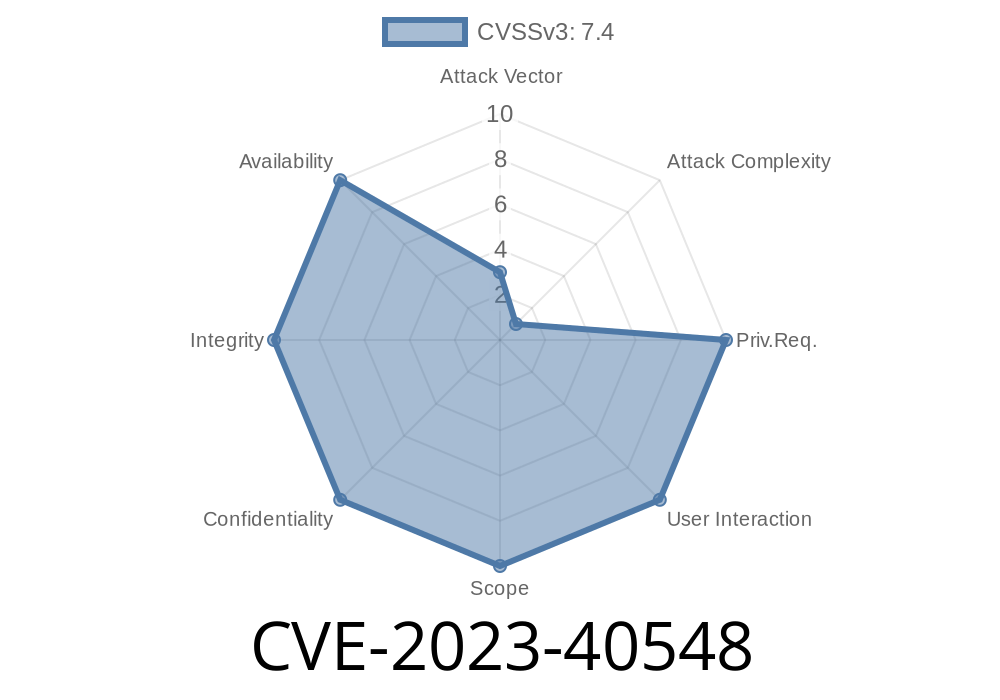Shim is a small bootloader used by many Linux distributions to enable secure booting on modern UEFI systems. It acts as a trusted first-stage loader so that the rest of your boot chain—like GRUB and the Linux kernel—can start in a secure way. In early 2023, a critical vulnerability was discovered in Shim that directly impacts 32-bit systems: CVE-2023-40548. If you run Fedora, Ubuntu, Debian, or other UEFI-enabled distros, this bug is worth your attention.
Let’s break down how this buffer overflow happens, show the vulnerable code, and talk about what an attacker could achieve with this flaw.
A Quick Overview: What’s CVE-2023-40548?
CVE-2023-40548 is a heap-based buffer overflow vulnerability in Shim’s 32-bit codebase. It occurs when a size value, parsed from a user-supplied Parameter Element (PE) binary—a type of Windows-style executable that UEFI uses for boot components—is not properly checked. This user-controlled value is then passed to memory allocation routines, and later used for copying data. This oversight opens a window to memory corruption, crashes, and potential exploitation.
Why is this dangerous?
The flaw lets an attacker control memory operations during the critical first steps of Linux boot. If the attacker can upload or modify the PE binary used by Shim (such as by replacing an EFI binary on disk in a dual-boot configuration), they could trigger a controlled overflow—crashing the system, hijacking the boot process, or even tampering with the integrity of loaded OSes.
Digging Into the Vulnerable Code
The vulnerability happens in Shim’s PE binary parser. Here’s an annotated, simplified version of the vulnerable code:
// Vulnerable Shim code (simplified for clarity)
UINT32 user_size = ParseSizeFromPEBinary(pe_binary);
// Not checking that user_size is within expected bounds
UINT8 *buffer = AllocatePool(user_size);
if (!buffer) {
// Allocation failed!
return EFI_OUT_OF_RESOURCES;
}
// Vulnerable: user_size could be much larger than intended, or wrap around
CopyMem(buffer, pe_binary, user_size);
What’s wrong here?
1. No Bounds Check: The user_size is parsed directly from the input, but isn’t checked to make sure it’s sane (e.g., not bigger than the actual PE binary or larger than available memory).
2. Heap Overflow: By giving a huge or wrapped-around value for user_size, an attacker can force Shim to allocate a buffer that’s too small—or even make the allocation fail, but the memory copy still goes ahead.
3. Memory Corruption: This type of unchecked copy operation is classic for heap corruption, and can lead to code execution or system instability.
Why 32-Bit Systems?
32-bit Shim code uses UINT32 values for many size and memory operations. These can wrap around (overflow) unexpectedly when arithmetic isn’t double-checked, making them especially dangerous for parsing user-controlled data like PE binaries.
Who’s at risk?
- Any Linux system using secure boot with Shim on a 32-bit UEFI platform (older laptops, embedded devices).
- Scenarios where attackers can modify, supply, or replace EFI binaries (requires physical or prior logical access).
Denial of Service (DoS): Crash the boot process, leaving the system unbootable.
- Corrupt Boot Chain: Malicious binary could compromise OS integrity, possibly injecting persistent bootkits or rootkits.
- Privilege Escalation: In specialized cases, escalate privileges during boot by corrupting memory structures.
Given the context, here’s how an attacker might craft a PE binary to exploit CVE-2023-40548
# Pseudocode (Python) for crafting a malicious PE binary
# that sets a size field to a huge value.
pe_binary = bytearray(open("legit-shimx32.efi", "rb").read())
# Locate the size field in PE headers - this would require
# knowledge of PE format and Shim's parser specifics.
size_field_offset = x100 # Example offset - NOT REAL
malicious_size = xFFFFFFF # Unrealistically large value
# Overwrite the size field to trigger the overflow.
pe_binary[size_field_offset:size_field_offset+4] = malicious_size.to_bytes(4, byteorder="little")
with open("malicious.efi", "wb") as f:
f.write(pe_binary)
*Note:* The exact offset and size field will depend on the actual parsing logic in Shim.
Original References
- Shim Project GitHub Advisory
- Mitre CVE Page
- Red Hat Security Advisory (RHSA-2023:40548)
- Shim Upstream Commit Fix
Upgrade your Shim package to the latest version (check with your Linux distro for patches).
- If you run untrusted binaries in EFI, or allow physical media booting, disable this feature until patched.
- Monitor boot logs for failed or corrupted boots; review UEFI boot order and loaded EFI binaries for unexpected changes.
Conclusion
CVE-2023-40548 is a prime example of how complex, subtle bugs happen at the earliest stages of system startup. Even a very small unchecked arithmetic operation can open a host to memory corruption and potentially deep system compromise. Keeping your boot components up to date—and understanding the importance of secure boot chain integrity—will keep your Linux setup safer.
Stay safe, keep patched, and respect your bootloaders!
*Written exclusively for you. For more on Linux boot security, keep following!*
Timeline
Published on: 01/29/2024 15:15:08 UTC
Last modified on: 03/05/2024 20:43:45 UTC
